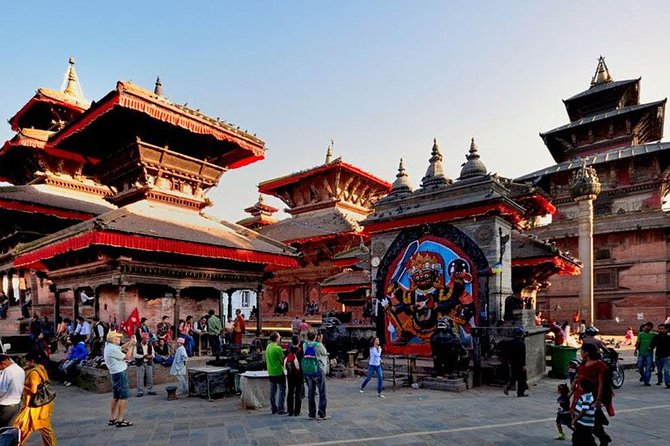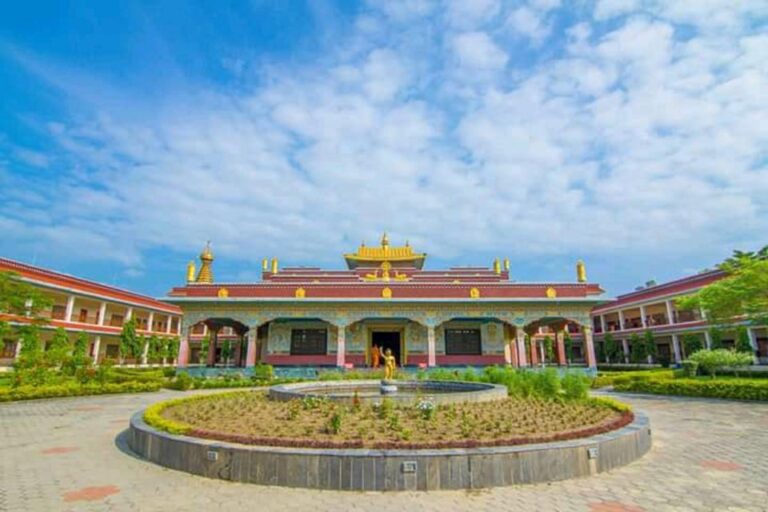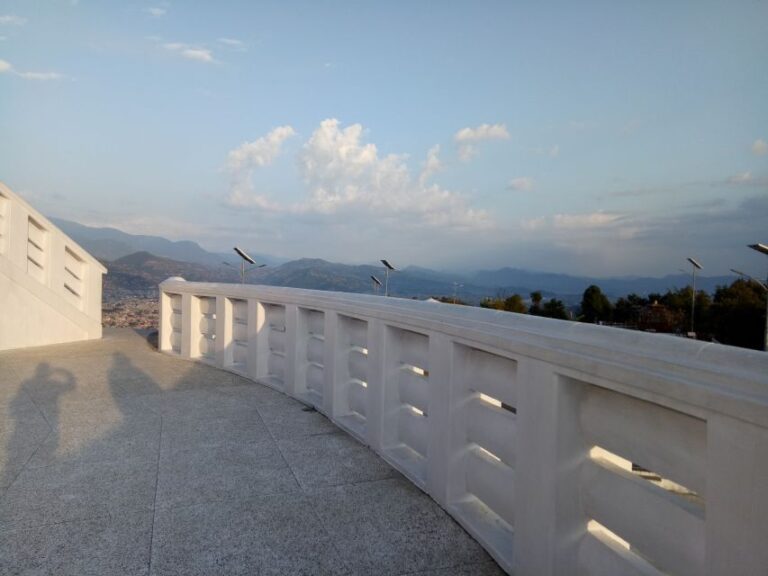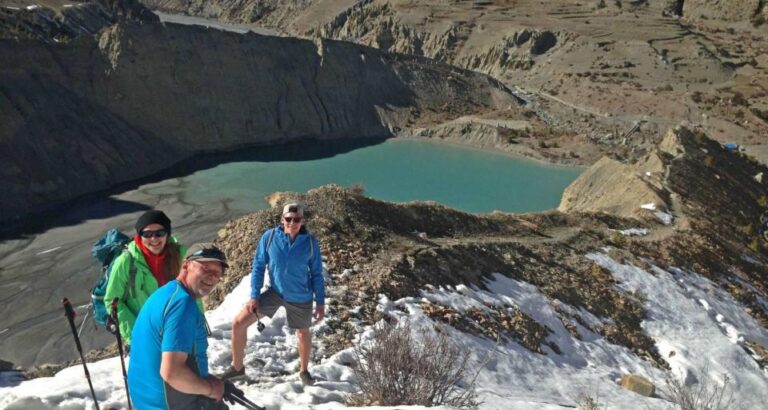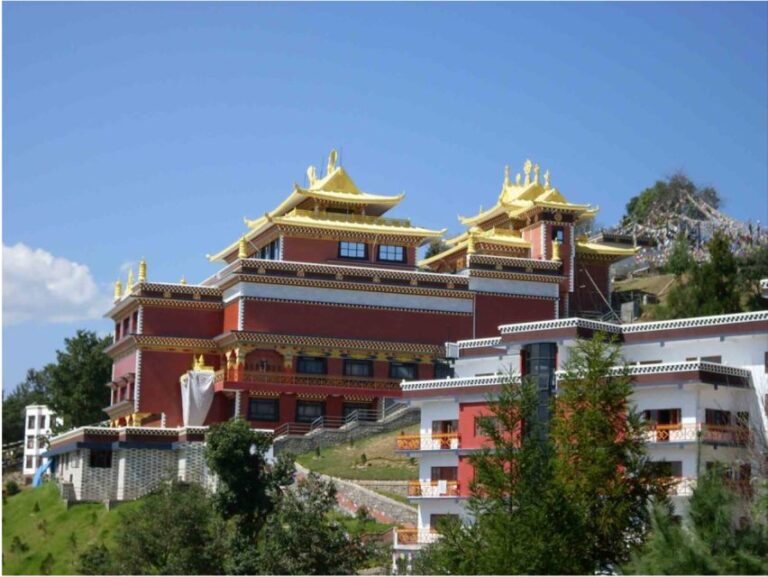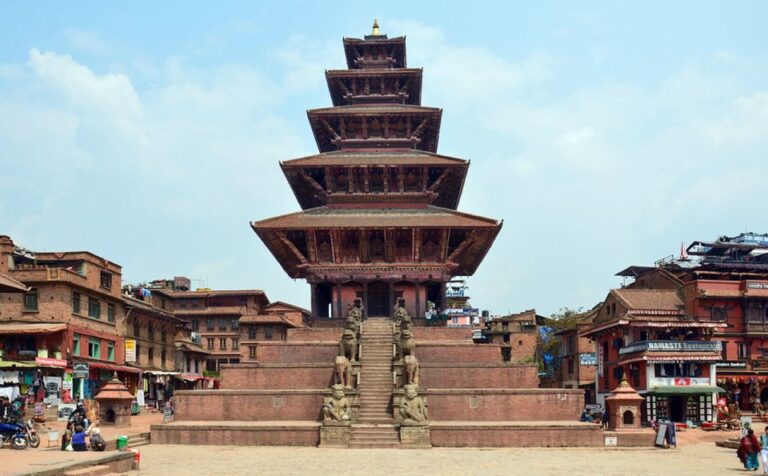From Kathmandu: Everest Base Camp Trek 11 Nights/12 Days
Is it possible to fully grasp the grandeur of the Himalayas in just 11 nights and 12 days?
The ‘From Kathmandu: Everest Base Camp Trek 11 Nights/12 Days’ adventure offers a glimpse into this extraordinary journey that encompasses not just physical endurance but also culture and natural beauty.
As travelers embark on this trek, they will uncover the secrets of the world’s highest peak and traverse through a landscape unlike any other.
The allure of the Everest region beckons, promising an experience that is both challenging and rewarding, leaving participants with memories that will last a lifetime.
Good To Know
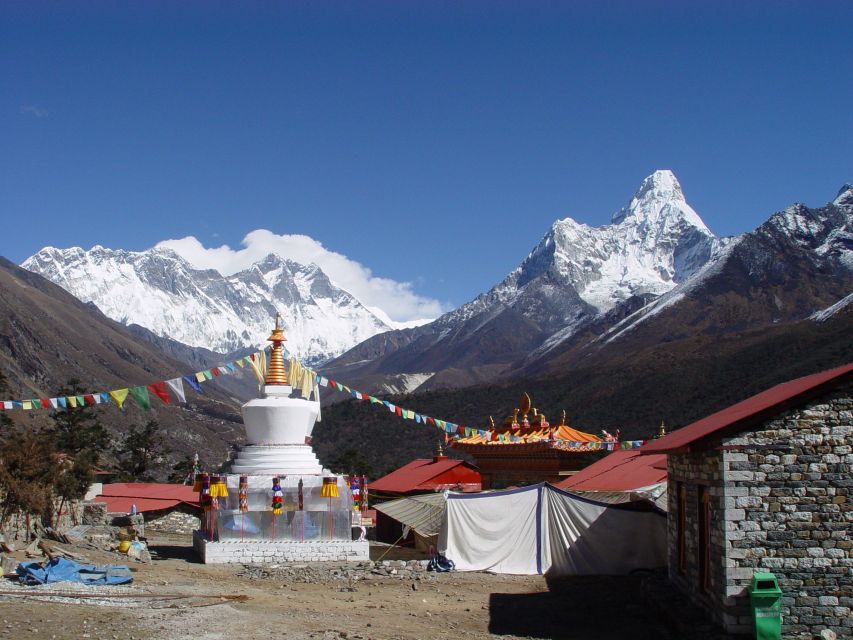
- Experience a 12-day trek to Everest Base Camp with a live English-speaking guide.
- Stay in cozy teahouse lodges, interact with Sherpa communities, and savor local Nepali cuisine.
- Trek through Sherpa villages, enjoy panoramic Himalayan views, and explore Namche Bazaar.
- Ensure safety with experienced guides, altitude sickness awareness, and environmental conservation practices.
Booking Details
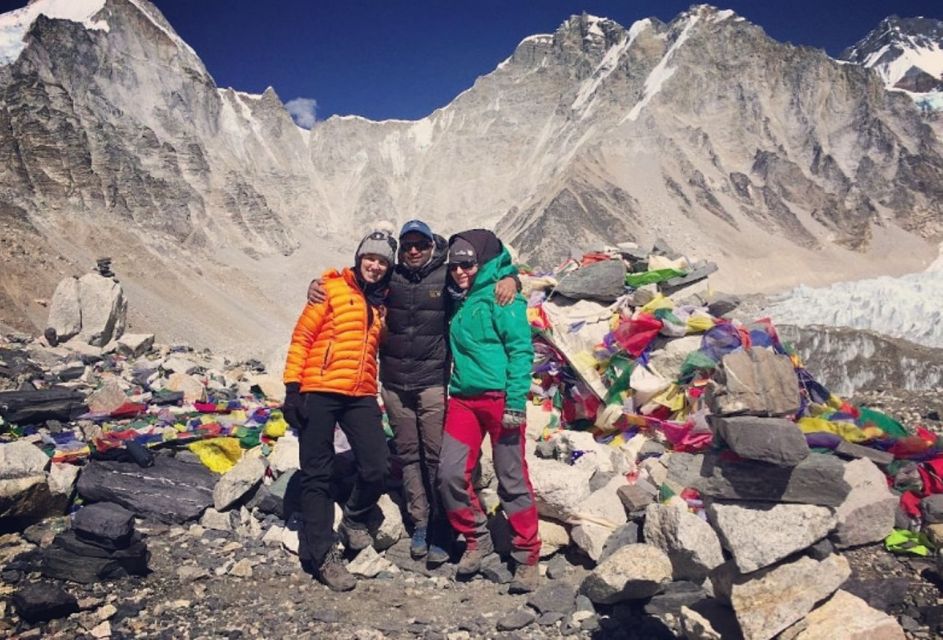
When booking the Everest Base Camp Trek from Kathmandu, travelers can take advantage of free cancellation up to 24 hours in advance and have the convenience of reserving now and paying later. It’s essential to ensure you have the necessary trekking gear for this adventure. Plus, travelers should consider obtaining travel insurance to provide coverage for any unforeseen circumstances during the journey.
Having the right equipment, such as sturdy trekking boots and warm clothing layers, is crucial for a successful trek. Travel insurance offers peace of mind and financial protection in case of emergencies. By preparing both trekking gear and travel insurance in advance, trekkers can focus on enjoying the breathtaking views and unique experiences that the Everest Base Camp Trek has to offer.
Itinerary Highlights
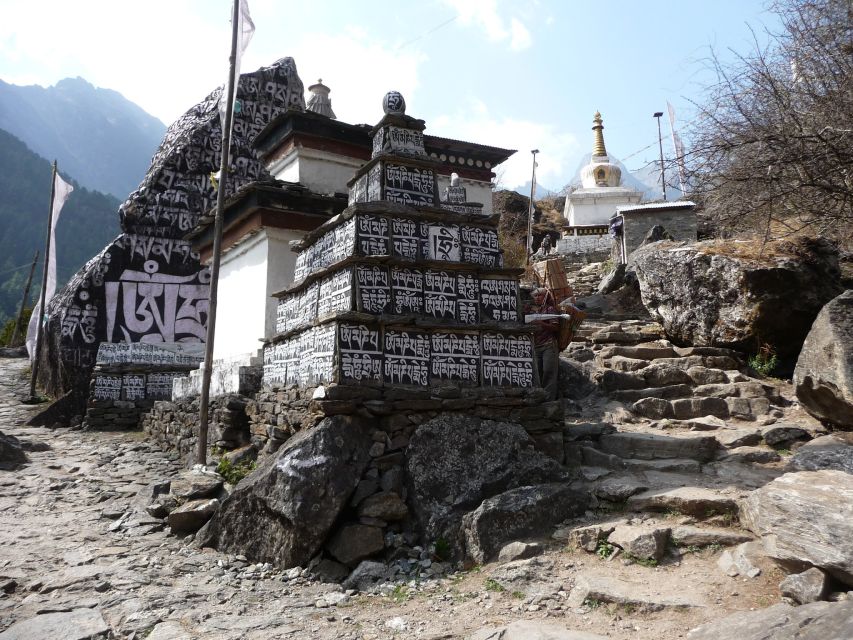
Trekking to Everest Base Camp unveils a captivating journey filled with stunning panoramic views, cultural encounters in Sherpa villages, and immersive experiences in Namche Bazaar.
- Sherpa Culture: Immerse in the unique traditions and lifestyle of the Sherpa community.
- Mountain Views: Witness awe-inspiring vistas of the Himalayas at every turn.
- Namche Bazaar Exploration: Discover the bustling market town, a hub for trekkers and locals alike.
The itinerary is carefully curated to provide trekkers with a well-rounded experience, blending nature’s grandeur with cultural richness. From the warm hospitality of the Sherpas to the majestic peaks that loom overhead, each day offers a new adventure waiting to be embraced.
Accommodation Information
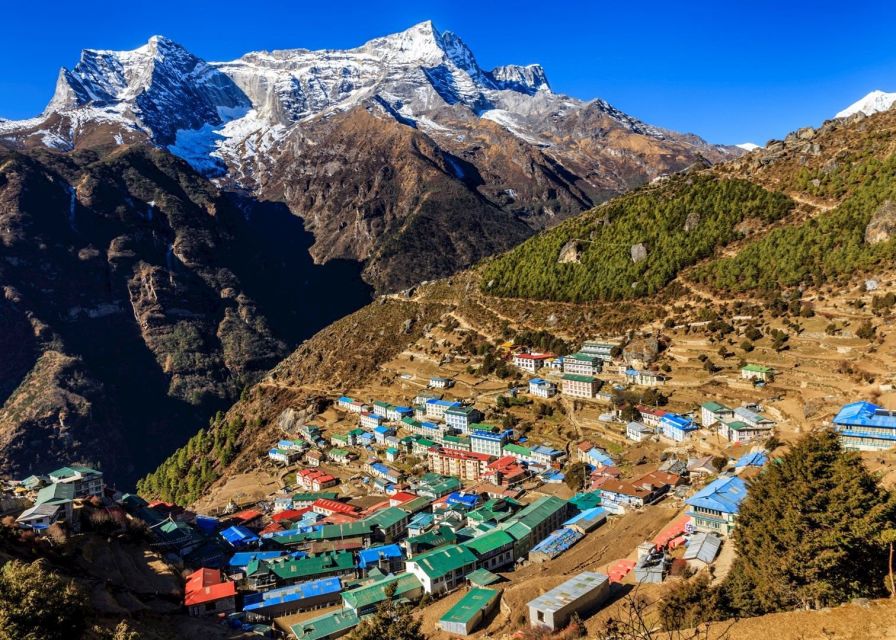
An essential aspect of the Everest Base Camp trek experience is the accommodation provided along the journey in teahouse lodges nestled amidst the Himalayan landscape. Trekkers will find shared accommodations in these teahouses, offering a glimpse into the mountain lifestyle and fostering a sense of camaraderie among fellow adventurers.
The teahouse lodges provide basic facilities with a cozy atmosphere, allowing trekkers to rest and rejuvenate after a day of trekking. Staying in shared rooms with other trekkers adds a communal aspect to the journey, enhancing the overall experience.
On top of that, the authentic local hospitality extended by the lodge owners contributes to a deeper culture, making the trek not just about reaching the destination but also about embracing the journey itself.
Fitness Level Requirements
For a successful Everest Base Camp trek experience, trekkers should be prepared for a moderate to challenging trek that requires daily walking hours of 6-8, gradual acclimatization to altitude gain, and physical fitness readiness. The altitude challenges can be demanding, necessitating proper training and preparation.
Here are some essential tips to enhance your fitness level for the trek:
- Training Tips:
- Incorporate cardiovascular exercises like hiking and running into your routine.
- Strengthen leg muscles with squats and lunges.
- Practice trekking with a weighted backpack to simulate the trekking conditions.
Being physically fit not only enhances your trekking experience but also helps mitigate the effects of altitude sickness, ensuring a safer and more enjoyable journey to Everest Base Camp.
Packing List Essentials
Essential items to pack for the Everest Base Camp trek include warm clothing layers, sturdy trekking boots, sun protection gear, water purification tablets, and a personal first aid kit. These gear essentials will ensure trekkers are prepared for the diverse mountain conditions they may encounter. Plus, mountain essentials like a headlamp, trekking poles, insulated gloves, and a refillable water bottle are crucial for a comfortable and safe journey. Below is a helpful table outlining the essential packing list items:
| Gear Essentials | Mountain Essentials |
|---|---|
| Warm Clothing Layers | Headlamp |
| Sturdy Trekking Boots | Trekking Poles |
| Sun Protection Gear | Insulated Gloves |
| Water Purification | Refillable Water Bottle |
Meal Details
When trekking to Everest Base Camp, trekkers can expect to enjoy a variety of local Nepali and Sherpa cuisine throughout their journey, ensuring a delightful culinary experience amidst the breathtaking Himalayan landscapes.
The meal details for the trek include:
-
Local Flavors: Trekkers will savor authentic Nepali and Sherpa dishes, such as dal bhat (rice and lentil soup), momos (dumplings), and thukpa (noodle soup), providing a taste of the region’s rich culinary heritage.
-
Vegetarian Options: Vegetarian trekkers will find ample choices, with dishes like vegetable curry, fried rice, and buckwheat pancakes, catering to diverse dietary preferences.
-
Hygienic Standards: Meals are prepared following strict hygiene practices, ensuring safe and nourishing dining experiences throughout the trek.
Safety Measures
Safety on the Everest Base Camp trek is ensured through experienced local guides, an emergency evacuation plan, and first aid trained staff. These measures are crucial for handling any emergencies that may arise during the trek.
The guides are well-versed in emergency response procedures and are trained to recognize the symptoms of altitude sickness, ensuring the well-being of trekkers. Altitude awareness is emphasized throughout the journey, with acclimatization days included in the itinerary to help prevent altitude-related issues.
Plus, the staff is equipped with first aid training to provide immediate assistance if needed. Trekkers can rest assured that safety is a top priority, allowing them to enjoy the stunning views and unique experiences that the Everest Base Camp trek has to offer.
Environmental Impact Considerations
To minimize the negative environmental impact of the Everest Base Camp trek, travelers are encouraged to follow eco-friendly practices and support local communities along the route. Supporting sustainability and community engagement are key factors in ensuring the long-term preservation of the natural beauty of the region.
Here are three essential ways trekkers can contribute to environmental conservation and sustainable tourism:
-
Carry a refillable water bottle: By avoiding single-use plastics, trekkers can significantly reduce the amount of waste generated during the journey.
-
Stay in eco-friendly accommodations: Choosing lodges that prioritize sustainable practices helps in minimizing the carbon footprint of the trek.
-
Participate in community projects: Engaging with local initiatives and supporting community-led conservation efforts can foster positive relationships and contribute to the well-being of the communities along the trail.
Cultural Immersion Opportunities
Enjoy the rich cultural tapestry of the Everest Base Camp trek by engaging with the vibrant Sherpa community and exploring the fascinating world of Tibetan Buddhism.
Along the trek, trekkers can interact with the Sherpa people, known for their warm hospitality and unique traditions. Take the opportunity to learn about Sherpa traditions, such as their intricate weaving techniques and traditional clothing.
Plus, explore Buddhist practices by visiting monasteries and stupas that dot the landscape, offering a glimpse into the spiritual heart of the region. Participating in local festivals and ceremonies provides a deeper understanding of the cultural significance attached to these rituals, enriching your trekking experience with a profound culture.
Weather Conditions Awareness
When embarking on the Everest Base Camp trek, trekkers must remain vigilant about the varied climates that characterize the journey. Being prepared for weather changes is crucial for a safe and enjoyable experience. Here are some key points to consider:
-
Proper Gear: Trekkers should have appropriate clothing layers to stay warm and dry, especially as temperatures drop at higher altitudes.
-
Monsoon Season Precautions: During the monsoon season (June to September), heavy rainfall can lead to slippery trails and landslides, so it’s essential to be cautious and prepared.
-
Weather Impact on Schedule: Weather fluctuations can affect the trekking schedule, causing delays or changes in plans. Flexibility and awareness of weather forecasts are vital for a successful journey.
Miscellaneous Information
Amidst the breathtaking landscapes and cultural encounters along the Everest Base Camp trek, trekkers may find delight in unexpected moments of serenity and camaraderie. Travel stories shared around cozy teahouses offer a glimpse into the diverse experiences of fellow adventurers, adding depth to the journey.
Exploring local customs, such as the warm hospitality of the Sherpa community, provides a rich tapestry of traditions to take in. Trekkers can participate in traditional ceremonies, witness daily rituals, and gain insights into the unique way of life in the Himalayas. These interactions not only broaden cultural understanding but also create lasting memories that go beyond the physical challenges of the trek.
Frequently Asked Questions
Are There Any Opportunities for Wildlife Spotting During the Trek to Everest Base Camp?
While trekking to Everest Base Camp, trekkers may encounter wildlife like Himalayan Thars, snow leopards, and birds. These sightings offer fantastic photography opportunities amidst the stunning landscapes, adding a touch of adventure to the journey.
What Are the Bathroom Facilities Like Along the Trekking Route to Everest Base Camp?
Bathroom facilities along the Everest Base Camp trek route prioritize hygiene practices. Teahouse lodges offer basic but clean amenities. Waste disposal is managed thoughtfully. Trekkers can expect shared facilities, so respecting others’ space and maintaining cleanliness is essential.
Is There Wi-Fi or Internet Access Available at the Teahouse Lodges During the Trek?
While trekking to Everest Base Camp, trekkers should be prepared for limited connectivity options and minimal internet access at teahouse lodges. Embrace the digital detox and immerse in the natural beauty and cultural experiences.
Can Trekkers Purchase Additional Snacks or Supplies Along the Route, or Should They Bring Everything They Need From Kathmandu?
Trekkers can purchase additional snacks or supplies at local markets along the route for variety. They are encouraged to support local vendors and enjoy cultural experiences through trying local cuisine and souvenir shopping to enhance their journey.
How Are Emergencies or Medical Issues Handled During the Trek to Everest Base Camp?
During the trek, emergencies or medical issues on the Everest Base Camp route are handled by experienced local guides with medical training. They provide first aid, altitude sickness awareness, and have a plan for medical evacuation if needed.
Not for you? Here's more of our most recent tour reviews happening neaby
- Everest Panorama Trek
- Everest Base Camp: Budget 3 Hour Helicopter Sightseeing Tour
- Everest Base Camp Trek With Sunset View From Kalapathar
- Luxury Heli Tour 1 Day
- Everest Three Passes Trek
- Everest Base Camp Yoga Trek – 15 Days
- From Kathmandu: 13 Private Day Everest Base Camp Trek
- From Kathmandu: 12-Day Everest Base Camp Trek
- Lukla Flights From Kathmandu Ramechap
- Mera Peak, Nepal
- From Lukla: 10-Day Guided Trek to Everest Base Camp Trek
The Sum Up
Embark on the journey of a lifetime with the ‘From Kathmandu: Everest Base Camp Trek 11 Nights/12 Days’ experience. From stunning landscapes to culture, this trek offers a unique blend of adventure and authenticity.
Be prepared for a physically challenging yet rewarding expedition that will leave you in awe of the majestic Himalayas.
Don’t miss out on this opportunity to explore the wonders of the Everest region and create unforgettable memories along the way.
